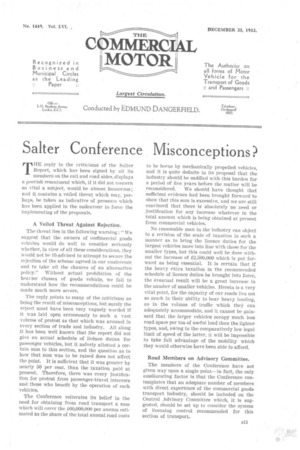Salter Conference Misconceptions?
Page 21

If you've noticed an error in this article please click here to report it so we can fix it.
THE reply to the criticisms of the Salter Report, which has been signed by all its members on the rail and road sides, displays a peevish resentment which, if it did not concern so vital a subject, would be almost humorous ; and it contains a veiled threat which may, perhaps, be taken as indicative of pressure which has been applied in the endeavour to force the implementing of the proposals.
A Veiled Threat Against Rejection.
The threat lies in the following warning : "We suggest that the owners of conTinercial goods vehicles would do well to consider seriously whether, in view of all these considerations, they would not be ill-advised to attempt to secure the rejection of the scheme agreed in our conference. and to take all the chances of an alternative policy." Without actual prohibition of the heavier classes of goods vehicle, we fail to understand how the recommendations could be made much more severe.
The reply points to many of the criticisms as being the result of misconceptions, but surely the report must have been very vaguely worded if it was laid open erroneously to such a vast volume of protest as that which was aroused in every section of trade and industry. All along it has been well known that the report did not give an actual schedule of licence duties for passenger vehicles, but it naïvely allotted a certain sum to this section, and the question as to how that sum was to be raised does not affect the point. It is sufficient that it was greater by nearly 50 per cent, than the taxation paid at present. Therefore, there was every justification for protest from passenger-travel interests and those who benefit by the operation of such vehicles.
The Conference reiterates its belief in the need for obtaining from road transport a sum which will cover the £60,000,000 per annum estimated as the share of the total annual road costs to be borne by mechanically propelled vehicles, and it is quite definite in its proposal that the industry should be saddled with this burden for a period of five years before the matter will be reconsidered. We should have thought that sufficient evidence had been brought forward to show that this sum is excessive, and we are still convinced that there is absolutely no need or justification for any increase whatever in the total amount which is being obtained at present from commercial vehicles.
No reasonable man in the industry can object to a revision of the scale of taxation in such a manner as to bring the licence duties for the largest vehicles more into line with those for the smaller types, but this could well be done without the increase of £2,500,000 which is put forward as being essential. It is certain that if the heavy extra taxation in the recommended schedule of licence duties be brought into force, the eventual result will be a great increase in the ninnber of smaller vehicles. Herein is a very vital point, for the capacity of our roads lies not so much in their ability to bear heavy loading, as in the volume of traffic which theY can adequately accommodate, and it cannot be gainsaid that the larger vehicles occupy much less road space per ton of useful load than the lighter types, and, owing to the comparatively low legal limit of speed of the latter, it will be impossible to take full advantage of the mobility which they would otherwise have been able to afford.
Road Members on Advisory Committee.
The members of the Conference have not given way upon a single point—in fact, the only ameliorating factor is that the Conference contemplates that an adequate number of members with direct experience of the commercial goods transport industry, should be included on the Central Advisory Committee which, it is suggested, should be set up to consider the system of licensing control recommended for this section of transport.




















































































